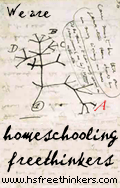This is the book I would most likely recommend first to anyone considering homeschooling or those concerned with improving the education of a traditionally schooled student.
Oliver Van DeMille lays out a very clear, simple plan. A Thomas Jefferson Education, an education typical of the kind that produced great statesmen, requires only two things: A mentor and the classics. Read, discuss, write, and apply. That's basically it. There is a little handholding for the still insecure with a brief schedule elaborating how to pull it together, appendices of book lists, and sample discussion questions, but otherwise, it's pretty self-explanatory. No more whining, "But how do I do it?" Be an active participant, read the books along with your students, encourage discussion, and apply your discoveries to a modern-day situation.
He describes the three types of education systems as public (conveyor belt), professional (private), and leadership (either public, private, or homeschool, using the mentor and classics format.) What is important to remember is that, "using the public school doesn't mean you have to rely on the conveyor belt; and just because you're home schooling doesn't mean you are off the conveyor belt. If you are still worried about curriculum and hidden secrets of teaching, chances are you still have one foot in the system."
The book is a quick, informative, and encouraging read. I feel reassured that my efforts to pare down and consolidate our curriculum are legitimate and focused, not merely lazy.
My impression is that he falls short in two areas, though. First, he doesn't specify any classical languages when discussing foreign language study. The founding fathers surely had an education that included a working knowledge of classical languages, if not outright fluency, as opposed to say, only Spanish. I also think he missed the mark slightly on his advice for teaching writing. I like the idea of keeping a "Commonplace Book," or student journal of what was studied and learned each day, recording a recap of the day's material -- imagine how easy an end-of-year portfolio review would be -- and his other recommendations to write, rewrite, accept only quality work, and find an audience for the student's work to encourage diligence make sense, but I wonder why he did not suggest the method I've seen repeatedly attributed to the founding fathers, one that Benjamin Franklin advocates and explains in his autobiography, and that's learning writing through imitation. Van DeMille implies that simply reading quality material, without actively studying mechanics and construction, will enable your student to become a skilled writer. Learning Latin or Greek would cover both foreign language studies as well as the technical aspects of writing.
Much of his advice reminded me of posts I've saved from the Well Trained Mind boards, ones written by MFS describing her Family Centered Learning Project (FCLP.) Read, discuss, write, apply. It really is that simple.
Looking For a Secular Florida Umbrella School?
Tuesday, January 25, 2005
Subscribe to:
Post Comments (Atom)











No comments:
Post a Comment